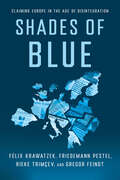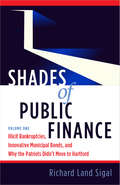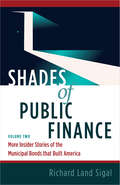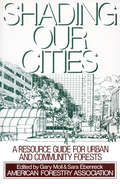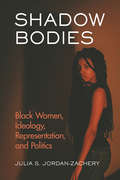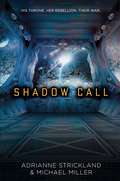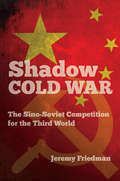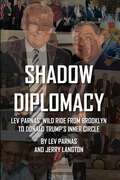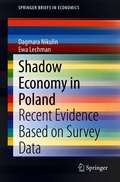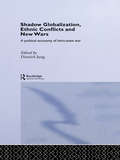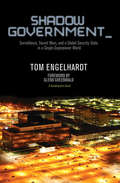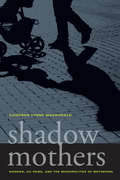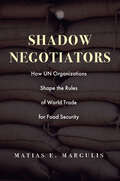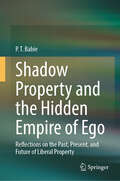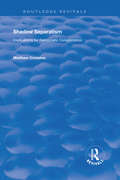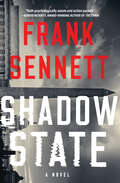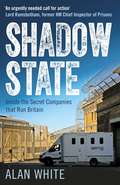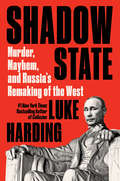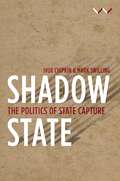- Table View
- List View
Shades of Blue: Claiming Europe in the Age of Disintegration
by Félix Krawatzek Friedemann Pestel Rieke Trimcev Gregor FeindtIn Shades of Blue, Félix Krawatzek, Friedemann Pestel, Rieke Trimçev, and Gregor Feindt investigate the political project of "Europe" as it oscillates between the extremes of expectations of an ever-wider integration and fear of disintegration. The authors interrogate and chart the space between these polarities by tracking the many competing conceptions of Europe in European public discourse and relate these meanings to national, regional, and ideological divisions. Based on qualitative discourse analyses of newspaper articles from six European Union member states between 2004 and 2023, Shades of Blue shifts how we think about Europe's integration and disintegration and offers a new perspective on Europeanization. With twelve debates chronicling Europe's past and discussing the implications for Europe's future, these authors uncover how politicians, intellectuals, and journalists negotiate European senses of belonging. Shades of Blue moves beyond the binaries of hope and despair to uncover a more nuanced picture of Europe.
Shades of Mao: The Posthumous Cult of the Great Leader
by Geremie Barme"Essays, poems, songs, folkloric anecdotes and photographs celebrating the myth of Mao. ... The editor supplies an insightful, and cohesing introduction". -- Reference & Research Book News"(A) highly entertaining and informative collection of translations of official, admiring, tacky, but sometimes also highly critical writings, and illustrations of objects, all featuring Mao. ... A must-have book for everybody interested in contemporary China, Mao, and his legacy now and in the future". -- China Information
Shades of Public Finance Vol. 1: Illicit Bankruptcies, Innovative Municipal Bonds, and Why the Patriots Didn't Move to Hartford (Shades of Public Finance #1)
by Richard Land Sigal"Using knowledge gained in fifty-plus years at the cutting edge of public finance, Sigal clears the smoke and moves the mirrors to let the rest of us see how it is done.... When they say it is not about the money, they are wrong. It always is. And the ultimate question is ‘whose money?’ " - Majorie Smith, Chair, New Hampshire House Judiciary Committee; former Chair, NH House Finance Committee and Joint Fiscal CommitteeShades of Public Finance Vol. 1 lifts the curtain on aspects of American civil and financial underpinnings that most people know little about. Local water treatment systems, state university campuses, roads, parks and many other features of our cities and states have been built with local control and local decision-making because imaginative figures like Richard Sigal found ways to turn community assets into cash through bonds. Sigal explains in clear language how bonds are structured, who gets rich, who gets stuck and how politics impacts bond financing. This book will answer these questions and more:•Why the Patriots didn't move to Hartford;•Why bankruptcy and a city manager in Detroit may not have helped the city; •How we quietly abandoned the principles of Alexander Hamilton in 2016; •How municipal bonds really work; •And who really gets rich from your taxes and bonds. Sigal highlights the frightening prospect of centralized, federal control of local communities infrastructure and growth because municipal bankruptcy has become an acceptable strategy in difficult financial times, despite workable options that preserve local creditworthiness. "A great read for history and to grasp the importance of public finance experts in meeting everyday needs." ---Thomas Ritter, Chair, UCONN Board of Trustees; past Speaker of the Connecticut House of Representatives
Shades of Public Finance Vol. 2: More Insider Stories of the Municipal Bonds that Built America (Shades of Public Finance #2)
by Richard Land Sigal"In Texas, there are 4,900 parcels of property within 500 feet of the border....The entire process of “eminent domain” — the legal term for government taking private property — along the border makes a sham of the Constitution’s requirement that 'private property (not) be taken for public use, without just compensation.'" -InsideSources, "Building the Wall Using Eminent Domain Hurts Americans"Shades of Public Finance Vol. 2 takes readers through some of the most pressing concerns of the day. Welcome to learning about these important issues in public finance: •clean water, •solid waste disposal, •highways, utilities, open space, •gambling and native Americans, •public authorities, •reciprocal tax immunity, and •eminent domain. You may not realize it, but these topics reside in the shadows of your everyday life and budget."Whether you write the tax laws or pay the taxes that result, function in the private sector or the public, or care about potholes or wastewater, you will find Sigal’s stories behind the stories fascinating. When they say it is not about the money, they are wrong. It always is. And the ultimate question is ‘whose money?’ Sigal explains it clearly." - Majorie Smith, Chair, New Hampshire House Judiciary Committee; former Chair, NH House Finance Committee and Joint Fiscal Committee
Shades of the Past
by Harold S. WilliamsProwling among these stories about Japan one finds riffraff and gentlemen, pirates and warriors, saints and sinners, smugglers and legitimate businessmen.All those, in fact, who made up the foreign communities of Japan in the early days. Harold S. Williams tells about them with the same inimitable humor, irony, drama and whimsy that made his earlier Tales of the Foreign Settlements such a popular success. With due regard for historical accuracy he recreates those fantastic days and the furor and fun with which they were filled.Here you can enjoy the privileged social status of belonging to the Victorian Volunteer Steam Fire Engine Company of Yokohama; you can join those Japanese pirates who were the first to meet Englishmen; arbitrate Japan's first labor dispute, involving foreigners, of course; witness the massacre of forty thousand Japanese Christians; revel in Nagasaki when it was the Paris of the Far East; travel over the Tokaido when it was the most picturesque and colorful of the world's highways; watch at close range each gruesome detail of an act of harakiri; dive for sunken treasures; watch the world's largest wooden vessel burn to the water line; marvel at one of the greatest advertising feats of all time.
Shades of the Past
by Harold S. WilliamsProwling among these stories about Japan one finds riffraff and gentlemen, pirates and warriors, saints and sinners, smugglers and legitimate businessmen.All those, in fact, who made up the foreign communities of Japan in the early days. Harold S. Williams tells about them with the same inimitable humor, irony, drama and whimsy that made his earlier Tales of the Foreign Settlements such a popular success. With due regard for historical accuracy he recreates those fantastic days and the furor and fun with which they were filled.Here you can enjoy the privileged social status of belonging to the Victorian Volunteer Steam Fire Engine Company of Yokohama; you can join those Japanese pirates who were the first to meet Englishmen; arbitrate Japan's first labor dispute, involving foreigners, of course; witness the massacre of forty thousand Japanese Christians; revel in Nagasaki when it was the Paris of the Far East; travel over the Tokaido when it was the most picturesque and colorful of the world's highways; watch at close range each gruesome detail of an act of harakiri; dive for sunken treasures; watch the world's largest wooden vessel burn to the water line; marvel at one of the greatest advertising feats of all time.
Shading Our Cities: A Resource Guide For Urban And Community Forests
by Sara Ebenreck Gary Moll Dale Robertson American Forestry AssociationShading Our Cities is a handbook to help neighborhood groups, local officials, and city planners develop urban forestry projects, not only to beautify their cities, but also to reduce energy demand, improve air quality, protect water supplies, and contribute to healthier living conditions.
Shadow Bodies: Black Women, Ideology, Representation, and Politics
by Julia S. Jordan-ZacheryWhat does it mean for Black women to organize in a political context that has generally ignored them or been unresponsive although Black women have shown themselves an important voting bloc? How for example, does #sayhername translate into a political agenda that manifests itself in specific policies? Shadow Bodies focuses on the positionality of the Black woman’s body, which serves as a springboard for helping us think through political and cultural representations. It does so by asking: How do discursive practices, both speech and silences, support and maintain hegemonic understandings of Black womanhood thereby rendering some Black women as shadow bodies, unseen and unremarked upon? Grounded in Black feminist thought, Julia S. Jordan-Zachery looks at the functioning of scripts ascribed to Black women’s bodies in the framing of HIV/AIDS, domestic abuse, and mental illness and how such functioning renders some bodies invisible in Black politics in general and Black women’s politics specifically.
Shadow Call
by Michael Miller AdriAnne StricklandThe rip-roaring space adventure sequel to the book that NYT bestselling author Lindsey Cummings heralded as "an explosive debut" has arrived! Full of action and romance, as if Star Wars was done in the vein of Joss Whedon's Firefly.His throne. Her rebellion. Their war.Qole is the youngest starship captain in living memory on her homeworld of Alaxak and has spent her life hunting a dangerous energy source called Shadow. Alaxans distrust and evade the galaxy's royalty as a rule, but Qole is now harboring the exiled Prince Nevarian Dracorte, along with some very conflicting feelings about it--and him.Nev's feelings are just as complicated, but not towards her. When it comes to Qole, he knows one thing: he'd do anything to stay with her. But when Alaxak is attacked and Nev finds himself framed for murder, he realizes the only way to help Qole and her people is to fight for the throne that should be his. To become the royal she might hate.As for Qole, she would never have imagined herself as the leader of a rebellion. Despite that, she soon realizes that hiding from her power is no longer an option. It's time to answer the call, even if it kills her."The action is once again breathtaking, heart pounding, and intense...If you loved Shadow Run, you'll devour Shadow Call. The perfect blend of action, intrigue, and a dash of slow-burn romance. I loved every minute!" --Jen Brown Writes"Just as fast-paced and enjoyable as Shadow Run...If you like science fiction, you really have to check out this series." --Here's to Happy Endings
Shadow Cold War: The Sino-Soviet Competition for the Third World (The New Cold War History)
by Jeremy FriedmanThe conflict between the United States and the Soviet Union during the Cold War has long been understood in a global context, but Jeremy Friedman's Shadow Cold War delves deeper into the era to examine the competition between the Soviet Union and the People's Republic of China for the leadership of the world revolution. When a world of newly independent states emerged from decolonization desperately poor and politically disorganized, Moscow and Beijing turned their focus to attracting these new entities, setting the stage for Sino-Soviet competition. Based on archival research from ten countries, including new materials from Russia and China, many no longer accessible to researchers, this book examines how China sought to mobilize Asia, Africa, and Latin America to seize the revolutionary mantle from the Soviet Union. The Soviet Union adapted to win it back, transforming the nature of socialist revolution in the process. This groundbreaking book is the first to explore the significance of this second Cold War that China and the Soviet Union fought in the shadow of the capitalist-communist clash.
Shadow Commandos II: Sky Operation
by G. G. Vega P. SepulvedaA book on special force commandos full of character and tension. The narration of an fictional event that is not so distant from global reality in terms of special forces. Shadow Commandos II addresses the present-day global military situation, the constant international tensions, the technological developments and the consequences underlying certain circumstantial situations. This book will help the reader understand that in the world there are no good or bad guys, simply a tug-of-war involving international and national interests that often lead to extreme situations that diplomacy must try to cool down and handle. An interesting and highly recommended read.
Shadow Diplomacy: Lev Parnas and his Wild Ride from Brooklyn to Trump’s Inner Circle
by Lev Parnas and Jerry LangtonLev Parnas has seen just about everything. A wheeler-dealer from the streets of Brooklyn, his adventures took him to Moscow to Wall Street to Hollywood to Miami to the White House and, eventually, to prison. His fascinating, eye-opening story offers an insider’s view of how money and power actually work to keep the world running exactly the way some want it to.
Shadow Economy in Poland: Recent Evidence Based on Survey Data (SpringerBriefs in Economics)
by Ewa Lechman Dagmara NikulinThe book provides an estimate of the size of the shadow economy in Poland. Using analogous data, it traces core determinants of the existence of the shadow economy in Poland. It compares results with neighbouring countries, and if possible, the remaining Central-Eastern economies.The book tells why the problem of the unreported economic activity matters; it presents the problem from different angles―economic, social and institutional. Next, it extensively reviews past research on the size and determinants of the shadow economy in Poland. It discusses available resources and empirical results showing the problem from micro-, and macroeconomic perspective. The authors present the methods used and the results of the survey, which are interpreted and discussed Finally it concludes on major drivers of shadow economy in Poland, providing recommendations and future research directions. The book is intended for practitioners and those seeking understanding of undeclared economic activities.
Shadow Empires: An Alternative Imperial History
by Thomas J. BarfieldAn original study of empire creation and its consequences, from ancient through early modern timesThe world’s first great empires established by the ancient Persians, Chinese, and Romans are well known, but not the empires that emerged on their margins in response to them over the course of 2,500 years. These counterempires or shadow empires, which changed the course of history, include the imperial nomad confederacies that arose in Mongolia and extorted resources from China rather than attempting to conquer it, as well as maritime empires such as ancient Athens that controlled trade without seeking territorial hegemony. In Shadow Empires, Thomas Barfield identifies seven kinds of counterempire and explores their rise, politics, economics, and longevity.What all these counterempires had in common was their interactions with existing empires that created the conditions for their development. When highly successful, these counterempires left the shadows to become the world’s largest empires—for example, those of the medieval Muslim Arabs and of the Mongol heirs of Chinggis Khan. Three former shadow empires—Manchu Qing China, Tsarist Russia, and British India—made this transformation in the late eighteenth century and came to rule most of Eurasia. However, the DNA of their origins endured in their unique ruling strategies. Indeed, world powers still use these strategies today, long after their roots in shadow empires have been forgotten.Looking afresh at the histories of important types of empires that are often ignored, Shadow Empires provides an original account of empire formation from the ancient world to the early modern period.
Shadow Globalization, Ethnic Conflicts and New Wars: A Political Economy of Intra-state War (Routledge Studies In New International Relations Ser.)
by Dietrich JungFocusing on the political economy of so-called new wars, this book presents a series of studies that analyse the complexities of current warfare by moving from the global sphere to local spots of organised violence. It thus raises questions about the very idea of intra-state wars and shows that these wars are inseparably linked to the global econom
Shadow Government: Surveillance, Secret Wars, and a Global Security State in a Single-Superpower World (TomDispatch Books)
by Tom Engelhardt&“A book about secrets and surveillance . . . [from] one of the great forces on the side of clarity, democracy, openness, and really good writing&” (Rebecca Solnit, author of Hope in the Dark). In 1964, a book entitled The Invisible Government shocked Americans with its revelations of a growing world of intelligence agencies playing fast and loose around the planet, a secret government lodged inside the one they knew that even the president didn&’t fully control. Almost half a century later, everything about that &“invisible government&” has grown vastly larger, more disturbing, and far more visible. In his new book, Tom Engelhardt takes in something new under the sun: what is no longer, as in the 1960s, a national security state, but a global security one, fighting secret wars that have turned the president into an assassin-in-chief. Shadow Government offers a powerful survey of a democracy of the wealthy that your grandparents wouldn&’t have recognized. &“Tom Engelhardt is an iconoclast . . . Again and again, he goes to the heart of the matter, drawing on his awesomely wide reading, his knowledge of history, and his acute political radar system.&” —Adam Hochschild, author of King Leopold&’s Ghost and Mirror at Midnight &“This collection, focused on the new Orwellianism, is some of the finest writing and finest public service gathered together in book form for your portable pleasure and outrage.&” —Rebecca Solnit of Call Them by Their True Names &“Tom Engelhardt&’s writing on the new forms of government surveillance is crucial because he has spent a lifetime studying the rise of the national security state.&” —Juan Cole, professor of history at the University of Michigan
Shadow Hunter
by Geoffrey ArcherOne renegade captain threatens disasterHMS Truculent is a nuclear-powered, hunter-killer submarine, and one of the most deadly weapon systems in the world. Phil Hitchens is its distinguished British commander - who has broken away from a NATO exercise and embarked on his own darkly vengeful and deadly mission.Shadowhunter is the codename of the desperate sonar search for HMS Truculent, last seen heading for the Kola Inlet where the cream of Soviet sea power lies unsuspecting at anchor. Shadowhunter is Geoffrey Archer's nail-biting, authentic thriller of undersea battle and international tension - a chillingly credible account of the world brought to the brink of catastrophe.
Shadow Mothers
by Cameron Lynne MacdonaldShadow Mothers shines new light on an aspect of contemporary motherhood often hidden from view: the need for paid childcare by women returning to the workforce, and the complex bonds mothers forge with the "shadow mothers" they hire. Cameron Lynne Macdonald illuminates both sides of an unequal and complicated relationship. Based on in-depth interviews with professional women and childcare providers-- immigrant and American-born nannies as well as European au pairs--Shadow Mothers locates the roots of individual skirmishes between mothers and their childcare providers in broader cultural and social tensions. Macdonald argues that these conflicts arise from unrealistic ideals about mothering and inflexible career paths and work schedules, as well as from the devaluation of paid care work.
Shadow Negotiators: How UN Organizations Shape the Rules of World Trade for Food Security (Emerging Frontiers in the Global Economy)
by Matias E. MargulisShadow Negotiators is the first book to demonstrate that United Nations (UN) organizations have intervened to influence the discourse, agenda, and outcomes of international trade lawmaking at the World Trade Organization (WTO). While UN organizations lack a seat at the bargaining table at the WTO, Matias E. Margulis argues that these organizations have acted as "shadow negotiators" engaged in political actions intended to alter the trajectory and results of multilateral trade negotiations. He draws on analysis of one of the most contested issues in global trade politics, agricultural trade liberalization, to demonstrate interventions by four different UN organizations—the Food and Agriculture Organization (FAO), the World Food Programme (WFP), the Office of the High Commissioner for Human Rights (OHCHR), and the Special Rapporteur on the Right to Food (SRRTF). By identifying several novel intervention strategies used by UN actors to shape the rules of global trade, this book shows that UN organizations chose to intervene in trade lawmaking not out of competition with the WTO or ideological resistance to trade liberalization, but out of concerns that specific trade rules could have negative consequences for world food security—an outcome these organizations viewed as undermining their social purpose to reduce world hunger and protect the human right to food.
Shadow Property and the Hidden Empire of Ego: Reflections on the Past, Present, and Future of Liberal Property
by P. T. BabieThis book explores the nature of liberal property in the twenty-first century. It contains three parts. The first examines how we have arrived at the liberal concept of property—what many scholars call the 'bundle of rights' metaphor of property. This part argues that the liberal conception embodied in the bundle of rights metaphor is really a way of masking or hiding what property really is: an exercise of ego about the way goods and resources are used. Or, put another way, it enshrines the ability to suit personal preferences about the way things are used, rather than what might better serve the common good. The second part provides an important modern critique of the bundle of rights metaphor—that, in addition to being a collection of rights, property is also about social relations that exist between people. Through these social relations, which are contained in law, any decision that a person makes about how to use a good or resource necessarily carries implications for others. While those effects can be both positive and negative, we are much more familiar with the latter, including most of the global challenges we face today—climate change, extreme weather, global hunger, and global poverty. Taking those global challenges as its focus, the final part of the book suggests possible futures of property in which it is reconceived in ways that reduce the potential for negative impacts on others.
Shadow Separatism: Implications for Democratic Consolidation (Routledge Revivals)
by Matthew CrosstonOriginally published in 2004. Examining autonomy in the Russian Federation, Matthew Crosston ascertains how the regional use of bilateral autonomy treaties has influenced the long-term stability, legitimacy and efficacy of the state. The study challenges some long-accepted conclusions about democratization and the devolution of power, advancing into new international arenas Riker and Dahl's relatively-ignored theoretical concerns that decentralized federations are ineffective and disintegrative while centralized federations are consolidating. Scholars of Russian politics, democratization, ethnic conflict, comparative intergovernmental relations and development will find this book particularly stimulating.
Shadow State: A Novel
by Frank SennettPerfect for fans of Matthew Quirk and Barry Eisler, in Frank Sennett&’s hands, the world of a former military officer and Secret Service agent comes to harrowing life as a diabolical plot threatens everything he cherishes and believes.Ex-Army Ranger sniper Rafe Hendrix leads the Secret Service detail of President Wyetta Johnson. Rafe and Wyetta became close when they served together in Afghanistan and he saved her life during a recon misadventure that cost her a leg.The President&’s wife visits a D.C. private-school classroom, and Hendrix is on sniper duty when a suicide bomber heads toward the First Lady. Hendrix disobeys a direct order and an unthinkable disaster unfolds. Though Hendrix may have saved the First Lady, he&’s blamed for the carnage. And the violence hits harder than he ever could have imagined.Rafe is cast adrift after the incident and he leaves D.C. for Fort Stockton, Texas. His prospects brighten when he meets veterinarian Melody Sanchez and their romance begins to bloom. But there&’s still unfinished business waiting in the wings. Someone from the past is bent on revenge—and he has Rafe firmly in his sights. His plan is as twisted as they come—grisly recreations of some of the most terrible events from the past. And now it&’s up to Rafe to learn from history—or be doomed to repeat it.
Shadow State: Inside the Secret Companies that Run Britain
by Alan WhiteEvery year the British government spends £80 billion outsourcing public services. Today, private companies are responsible for fulfilling some of the most sensitive and important roles of the state - running prisons and providing healthcare, transport, legal aid, even child protection. These organizations have been handed enormous amounts of power and yet for the most part they operate with no transparency or accountability.From deportations to NHS cutbacks, Alan White exposes what goes wrong when the invisible hand of the market is introduced into public services. Informed by exclusive interviews with senior managers, campaigners and whistle-blowers, Shadow State is the first book to examine the controversial phenomenon of government outsourcing. Not only does White provide the full story behind scandals involving G4S, Serco and ATOS, but he also reveals previously unknown cases of system failure in areas such as social care, welfare and justice. The picture that develops is deeply troubling.
Shadow State: Murder, Mayhem, and Russia's Remaking of the West
by Luke HardingA thrilling account of how Russia is waging a hidden war against America and the West, using espionage, corruption, fake news, and KGB-style murderMarch 2018. Two Russian assassins arrive in a provincial English city to kill a former officer from Russia’s GRU intelligence agency. His crime? Passing secrets to British spies. The poison? A lethal nerve agent, novichok. The attempted execution was a reminder – as if one were needed - of Russia’s contempt for international norms. The Soviet Union and its doctrine are long gone, but the playbook used by the Kremlin’s spies during that long confrontation with the West is back. And the underlying goal remains the same: to undermine democracy and exploit divisions within American and European society and politics. Moscow’s support for Donald Trump in the 2016 presidential election has grown into the biggest political scandal of modern times. Its American players are well-known. In Shadow State, award-winning journalist and bestselling author Luke Harding reveals the Russians behind the story: the spies, hackers and internet trolls. Harding charts how the Kremlin has updated Communist-era methods of influence and propaganda for the age of Facebook and Twitter, and considers the compelling question of our age: what exactly does Vladimir Putin have on President Trump? Similar to those of the Cold War, Putin’s ambitions are truly global. His emissaries include oligarchs, bankers, lawyers, mercenaries, and agents of influence. They roam from Salisbury to Helsinki, Ukraine to Central Africa, London to Washington, D.C. Shadow State is the singular account of how the Kremlin seeks to reshape the world, to divide the US from its European friends, and to remake America in its own dark and kleptocratic image. This is an essential read for anyone who wants to understand how our politics came to be so chaotic and divided. Nothing less than the future of Western democracy is at stake.
Shadow State: The Politics of State Capture
by Ivor Chipkin Mark Swilling Haroon Bhorat Mzukisi Qobo Sikhulekile Duma Lumkile Mondi Camaren Peter Mbongiseni Buthelezi Hannah Friedenstein Nicky PrinsA powerful analysis of events that helped galvanise resistance across civil societyThe 2017 publication of Betrayal of the Promise, the report that detailed the systematic nature of state capture, marked a key moment in South Africa’s most recent struggle for democracy. In the face of growing evidence of corruption and of the weakening of state and democratic institutions, it provided, for the first time, a powerful analysis of events that helped galvanise resistance within the Tripartite Alliance and across civil society. Working often secretly, the authors consolidated, for the first time, large amounts of evidence from a variety of sources. They showed that the Jacob Zuma administration was not simply a criminal network but part of an audacious political project to break the hold of whites and white business on the economy and to create a new class of black industrialists. State-Owned Enterprises (SOEs) such as Eskom and Transnet were central to these plans.The report introduced a whole new language to discuss state capture, showing how SOEs were ‘repurposed’, how political power was shifting away from constitutional bodies to ‘kitchen cabinets’, and how a ‘shadow state’ at odds with the country’s constitutional framework was being built. Shadow State is an updated version of the original, explosive report that changed South Africa’s recent history.
